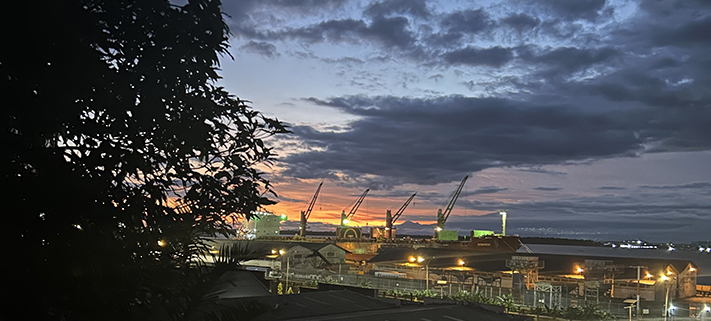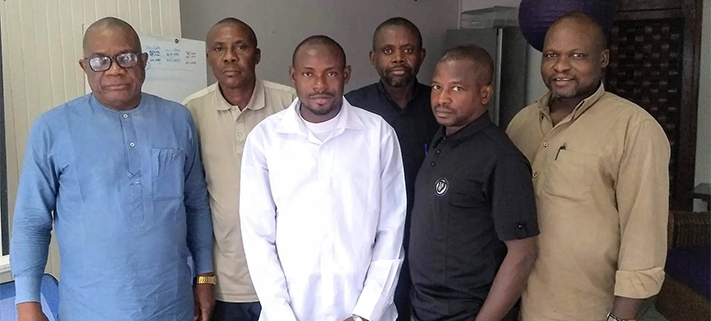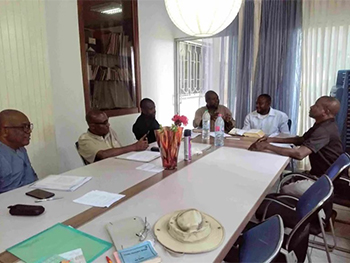Port of calling
“Port is where the heart is.” If you’re stitching a saying onto a pillow or a quilt for a sailor, maybe you can use that one. Port is important: It’s where a sailor reconnects with land and with all the comforts to be found there—if only for a short time, until the ship is ready to sail again.
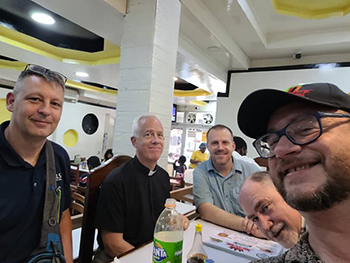
L to R: Stefan Felgenhauer, Dan Witte, Joel Hoff, Dan Kroll, Keegan Dowling
I was once a sailor on the M/V James R. Barker, a thousand-foot-long freighter ship hauling coal and taconite pellets back and forth across the Great Lakes of North America. Did you know that we have a system of Great Lakes here in Africa, too? My favorite port-of-call was Duluth, Minn. I enjoyed the beautiful book and music shops, as well as Erbert & Gerbert sub sandwiches. However, I had been hoping for more. I had hoped to find a WELS pastor who could visit me and give me communion. But there was a vacancy, a situation far too familiar to many of us in today’s WELS, some 20 years later.
The Port of Douala is one of the greatest port cities on the continent of Africa. In fact, it is the largest city in the country of Cameroon. When it comes to WELS mission work in West Africa, the Port of Douala actually functions like a spiritual port. When several of us missionaries met with pastors in September, only one of them was from Douala. All the rest of us were “ships,” so to speak, coming to Douala simply for the purpose of meeting around the gospel of Jesus Christ! Douala—for WELS mission work—is nothing more and nothing less than a “port of calling.”
Missionaries Dan Witte and Dan Kroll were studying and meeting with pastors from three West African synods: Christ the King and All Saints of Nigeria and the Lutheran Church of Cameroon (LCC). Because of the multi-dimensional security threats present in the region, for the moment WELS missionaries are not able to travel to Nigeria or to Cameroon, apart from just one city in Cameroon: Douala. Because we couldn’t meet them where they were, our brothers came to meet us in port. Missionary Joel Hoff flew in from Zambia, to give a presentation about the very successful TELL online outreach program, which pastors can use both to teach their congregations and to discover new prospects in their own country. Director of Missions Operations Stefan Felgenhauer also flew in from Wisconsin.
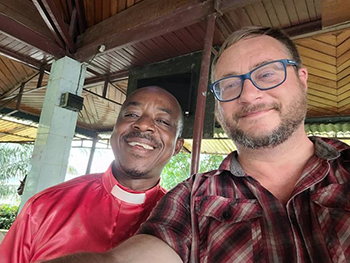
Missionary Keegan with Pastor Israel, professor at the seminary of the Lutheran Church of Cameroon
I, Missionary Keegan Dowling, also ended up in Douala, our port of gospel calling. I met with yet a different church body: Holy Trinity Lutheran Synod. They hail from a distant part of Cameroon, where there is a violent and dangerous conflict. Yet, a group of leaders trekked down to Douala, so that we could study the Bible together and talk about Holy Trinity’s mission plans. Holy Trinity is not yet in fellowship with WELS, but this is their desire. So, my job is to work with Holy Trinity along a pathway of studies and discussions that the One Africa Team uses to bring church bodies into fellowship.
An interesting thing about Holy Trinity Lutheran Synod is that many of the leaders and members speak French! In fact, they are our first French-speaking partner church body (although God is blessing our efforts in other parts of francophone Africa, too—stay tuned for future blog posts!) When we “drop anchor” in our “port of calling” we read the Bible together in French. We discuss the issues in French. And outside of class, walking around the Port of Douala, guess what? Missionaries like Pastor Kroll and I get to practice a lot of real-life French! Each trip adds to our capabilities. It further increases our ability to call: to call our fellow sinners to our common Savior throughout French-speaking Africa. This is why the Port of Douala is our “port of calling.” And, God willing, it will be joined by more ports of calling, too.
Written by Rev. Keegan Dowling, world missionary on the One Africa Team, based in Lusaka, Zambia.
Subscribe to future Missions Blogs at wels.net/subscribe.
WELS Missions
Learn about the ministry work of WELS Missions.
SUPPORT MISSIONS
Support the ministry work of WELS Missions.

